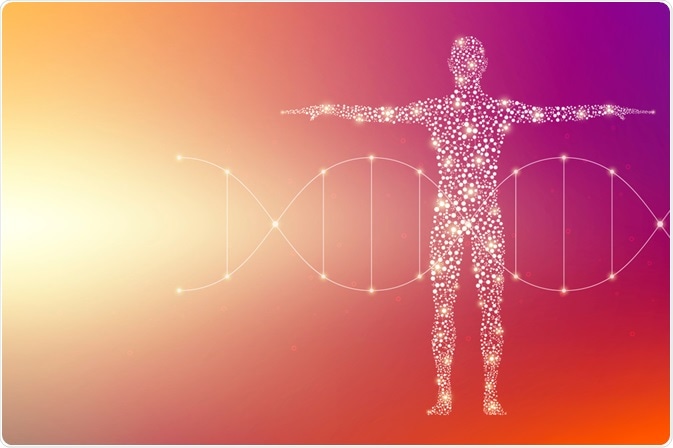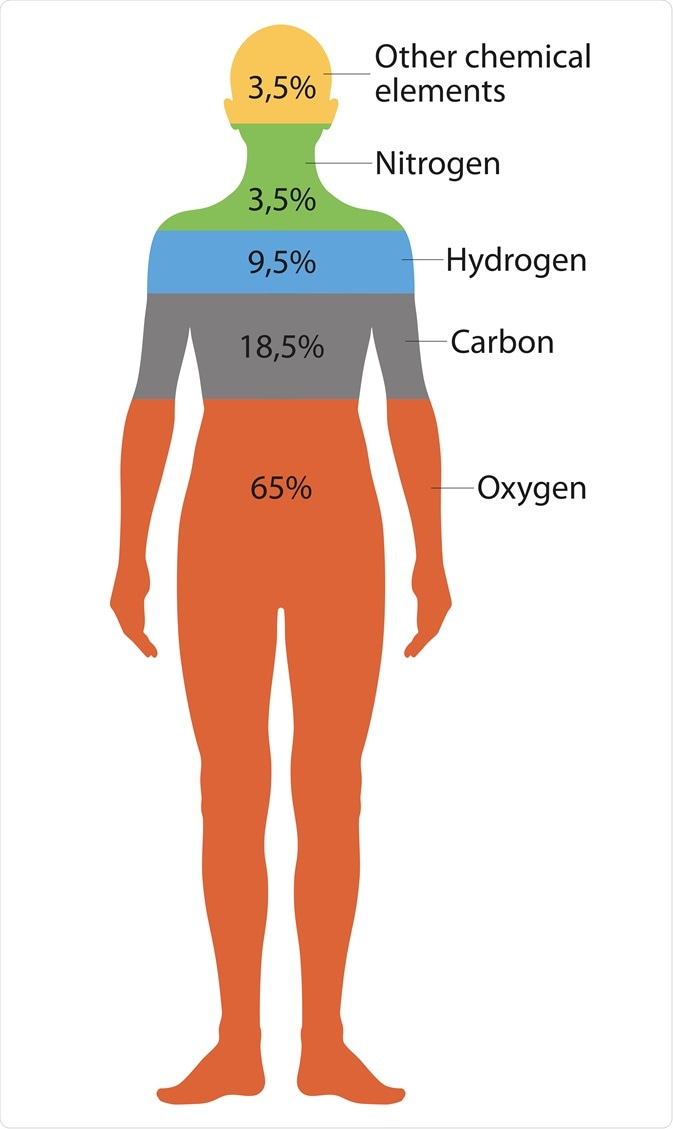Chemical elements are the building block of life. They make up the staggering variety of molecules that are combined to form DNA, cellular organelles, cells, tissues, and organs. This article will discuss those elements which are present in the human body, the proportion of them, and the various essential functions they play.
 Image Credit: bestber/Shutterstock.com
Image Credit: bestber/Shutterstock.com
Elements that make up the human body
The body is, for all intents and purposes, an extraordinarily complex machine. This requires a multitude of parts all working together in complicated relationships from the micro- to macromolecular level. The structure of the building blocks that make up the sum of these parts, such as proteins and nucleic acids, is determined by the proportion and interaction of chemical elements.
Some elements are much more common than others. The human body is approximately 99% comprised of just six elements: Oxygen, hydrogen, nitrogen, carbon, calcium, and phosphorus. Another five elements make up about 0.85% of the remaining mass: sulfur, potassium, sodium, chlorine, and magnesium. All of these 11 elements are essential elements.
The remaining 0.15% of the human body is comprised of trace elements. The combined mass of the trace elements does not add up to the mass of magnesium, which is the least common of the non-trace elements. Some of the trace elements (about a dozen or so) may be essential for life, based on laboratory evidence.
The function of chemical elements in the body
Most chemical elements found in the human body play a vital role. Some trace elements, such as titanium and cesium, may be contaminants. Some, such as lead, mercury, arsenic, and cadmium are active toxins depending on the amount present.
The function of the essential elements in the human body, by order of percentage of mass, are as follows:
Oxygen
Oxygen is the most common element in the human body by mass, comprising approximately 65.0% of body mass. Most of the oxygen present is found in the form of water. Oxygen plays a critical role in metabolism and respiration and the element is found in every major organic molecule in the body including proteins, carbohydrates, fats, and nucleic acids.
Carbon
Carbon is the next most common element in the human body, making up 18% of the body by mass. Its role is mostly structural, forming the “backbone” of many organic molecules.
Hydrogen
Hydrogen is the most abundant element in the universe (about 75% of total mass) and makes up around 10% of the human body by mass. It is present in the form of water (along with oxygen) as well as being an important element in organic molecules.
Nitrogen
Nitrogen comprises 3% of the human body by mass. It is found in all organisms in molecules such as amino acids (which make up proteins), nucleic acids (DNA and RNA), and adenosine triphosphate (ATP), an essential energy transfer molecule.
Calcium
Calcium is the most abundant metal in the human body, at around 1.4% by mass. Arguably its most well-known function is in the formation of bones and teeth and lack of calcium in the diet can lead to a variety of degenerative conditions. Other important roles in the human body include protein synthesis, maintaining the potential difference across cell membranes, and acting as second messengers in signal transduction pathways.
Phosphorus
Phosphorus is highly reactive, and because of this property, it is never found as a free element on Earth. Phosphates are essential to life, and this bound form of phosphorus is a major component of essential organic molecules such as phospholipids, ATP, and nucleic acids. It comprises 1.1% of the total body mass of the human body.
Potassium
Potassium makes up less than 1% of body mass. It plays a vital role in nerve transmission via the transfer of potassium ions across nerve cell membranes.
Sulfur
The tenth most common element in the universe and the fifth most common on Earth, sulfur plays an essential role in the human body. It is found in the body almost always in the form of metal sulfides and organosulfur compounds. Sulfur is also a major structural element of the protein keratin, which is found in skin and hair.
Sodium
Sodium, an alkali metal, is commonly found in salt. Sodium ions contribute to osmotic pressure as they are the major cation in the extracellular fluid (ECF.) Sodium also plays a key role in nerve transmission.
Chlorine
Chlorine plays an essential role in maintaining the acid-base balance of blood, along with the formation of tendons, teeth, and bones. It is commonly found in salts and in combination with potassium and sodium in the body. It also contributes to liver function and helps to eliminate organic waste.
Magnesium
Magnesium is the least common of the essential elements in the human body. Some 300 or so enzymes require magnesium ions to function properly, and magnesium ions interact with compounds such as DNA, RNA, and ATP.
Trace Elements
Trace elements play many roles, some more important than others, whilst others contribute no discernible function whatsoever. Some are actively toxic to humans.
The three most abundant essential trace elements are iron, fluorine, and zinc. Iron plays an essential role in human health as part of hemoglobin, which transports oxygen around the body in the blood. Fluorine is important for teeth. Zinc is required by over 300 enzymes and 1000 transcription factors and is vital for eye health and reproductive organ growth.
 Image Credit: Aldona Griskeviciene/Shutterstock.com
Image Credit: Aldona Griskeviciene/Shutterstock.com
In Conclusion
The main source of all of these elements is diet. Some of the elements are more essential than others and they are found in a staggering array of compounds and molecules in the human body.
Some can even cause active harm to the body and the levels at which they are present in the body can determine just how harmful the effects are. The proportions of chemical elements vary from person to person depending on a wide variety of factors, but as a rule, they are mostly uniform across the species.
What are you really made of?
Last Updated: Jun 19, 2023